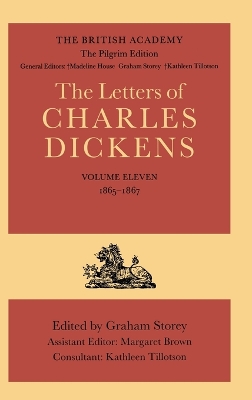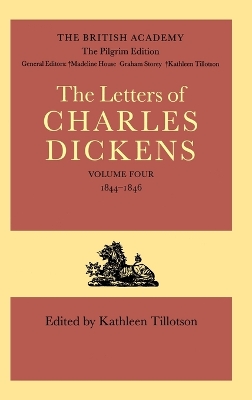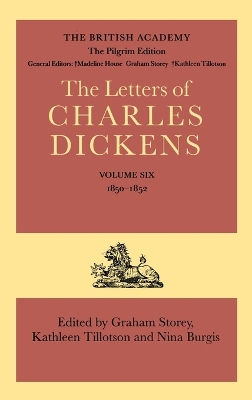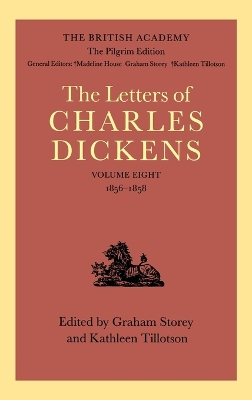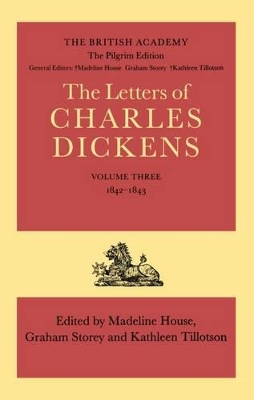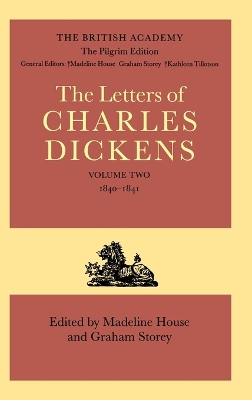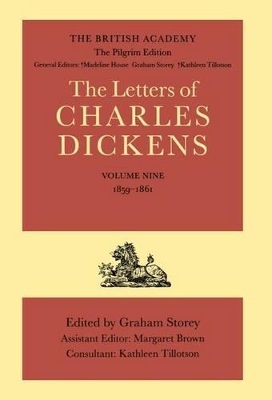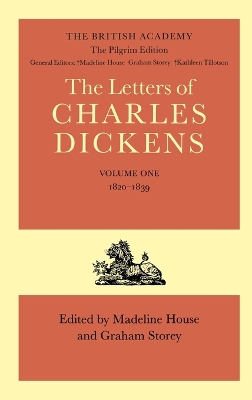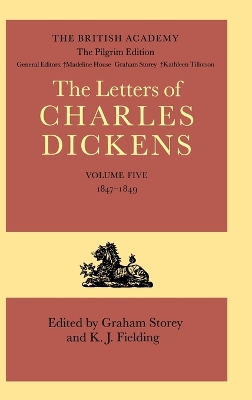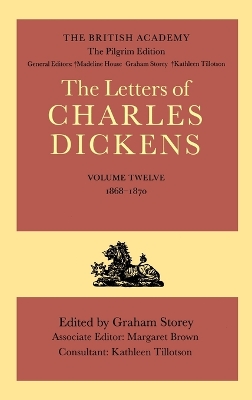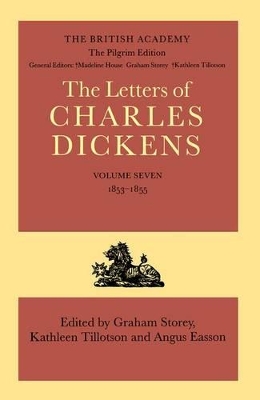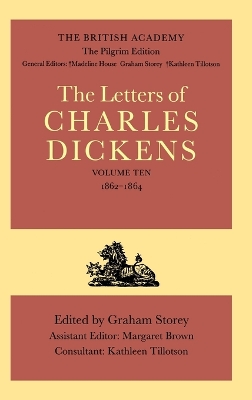Dickens: Letters Pilgrim Edition
12 total works
The British Academy/The Pilgrim Edition of the Letters of Charles Dickens: Volume 11: 1865-1867
by Charles Dickens
Junction', and `No Thoroughfare' (written jointly with Wilkie Collins) are again highly successful. He remains in high demand as chairman of a varied collection of public charitable dinners: they include charities to which he was constantly faithful, such as the Newsvendors' Benevolent Institution and the Royal General
Theatrical Fund; but he also presides, for the only time, at the Annual Dinner of the Dramatic, Equestrian, and Musical Sick Fund Association (14 February 1866) and - at the instigation of Charley Dickens, a keen oarsman and Committee member - at the Dinner of the Metropolitan Rowing Club (7 May 1866), making a particularly brilliant speech. The first reference to his swollen left foot, attributed by him to frost-bite, comes in February 1865; but the most dramatic event in this volume is the
railway accident at Staplehurst, Kent, on 9 June 1865, in which he is involved on returning from a short visit to France, accompanied by Ellen Ternan and her mother. The frontispiece shows him helping the injured and dying. He gives two provincial reading tours managed by George Dolby of Chappell &
Co., in 1866 and 1867, besides frequent readings in London. After a Farewell Dinner to him in London, with Lord Lytton in the Chair, he sails on 9 November 1867 from Liverpool to Boston, to begin his American tour of 75 readings.
The Pilgrim Edition of the Letters of Charles Dickens: Volume 4. 1844-1846
by Charles Dickens
The Pilgrim Edition of the Letters of Charles Dickens: Volume 6: 1850-1852
by Charles Dickens
Edward Bulwer Lytton founded the Guild of Literature and Art, a scheme to help writers and artists. He also suffered a number of personal blows: the deaths of his father, his baby daughter Dora, and two of his close friends, Richard Watson and Alfred D'Orsay; there was also anxiety over the illness
of his wife Catherine.
The British Academy/The Pilgrim Edition of the Letters of Charles Dickens: Volume 8: 1856-1858
by Charles Dickens
family, both in Boulogne and Paris, giving racy accounts of its theatres and his meetings with writers and artists. At his own amateur theatricals in 1857, his great success in Wilkie Collins's The Frozen Deep has lasting consequences; at the close of his work for the Douglas Jerrold Fund, the play
is repeated with professional actresses, including three members of the Ternan family. Later rumours of his relations with a young actress (Ellen Ternan) provoke him to an ill-advised public statement which leads to a breach with his publishers and with one of his closest friends, Mark lemon. Finally, he embarks on the first of many strenuous reading tours, giving 85 readings in over 40 towns, all within three months. His usual activities are not neglected: he makes many speeches for good
causes, and continues to edit Household Words (and its successor All the Year Round), with help from his friend and assistant editor Wills. Throughout, there is new material, both in the letters and in the editors' annotation, with some fresh interpretation of controversial matters.
The Pilgrim Edition of the Letters of Charles Dickens: Volume 3. 1842-1843
by Charles Dickens
The Pilgrim Edition of the Letters of Charles Dickens: Volume 2. 1840-1841
by Charles Dickens
Message from the Sea', and `Tom Tiddler's Ground'. He expends great energy in establishing All the Year Round, to succeed Household Words, and during 1860 writes the first fourteen of his Uncommercial Traveller series. During these three years he gives two provincial tours of readings, in addition to readings in London. He spends
a considerable part of his time at Gad's Hill, relying on his daughter Mamie and sister-in-law Georgina Hogarth to act as hostesses; the All the Year Round office becomes his London base. Ellen Ternan continues to act, though with diminishing success; in January 1859 Dickens almost certainly buys a long lease of 2 Houghton Place, Ampthill Square, for the Ternan family.
The Pilgrim Edition of the Letters of Charles Dickens: Volume 1. 1820-1839
by Charles Dickens
The Pilgrim Edition of the Letters of Charles Dickens: Volume 5. 1847-1849
by Charles Dickens
The British Academy/The Pilgrim Edition of the Letters of Charles Dickens: Volume 12: 1868-1870
by Charles Dickens
The volume begins with the final four months of Dickens's American tour of 75 readings, which had been conspicuously successful throughout, despite the appalling weather and his sufferings from "American" catarrh. The tour culminated on 18 April 1868 when the American Press held a dinner in his honour in New York. In July he rented Windsor Lodge, Peckham for Ellen Ternan, where she remained until after his death; he was to give two more English reading tours before his collapse at Preston on 22
April 1869.
In early January 1869 he was elected President of the Birmingham and Midland Institute; and a dinner in his honour was given in St George's Hall, Liverpool. Between January and March 1870 he gave a series of Farewell readings in London, and on 31 March Edwin Drood, No. 1 was published, illustrated by Luke Fildes; it continued monthly until 31 August.
Of the friends who died during this period, much the closest were the painter Daniel Maclise, to whom Dickens paid especial tribute at the Royal Academy Banquet of 30 April 1870; Mark Lemon, who died only 18 days before Dickens himself, and with whom he had a brief reconciliation after their bitter quarrel in 1858; and Chauncy Hare Townshend, who left him £2,000 to publish, as his Literary Executor, Religious Opinions of the Late Chauncy Hare Townshend, which appeared in November
1870.
The Pilgrim Edition of the Letters of Charles Dickens: Volume 7: 1853-1855
by Charles Dickens
August 1853 and in 1855 is writing the early numbers of Little Dorrit. He manages and acts in children's plays in his little Tavistock House theatre on Twelfth Night, and later takes the leading part in Wilkie Collins's drama The Lighthouse with great effect. Work with Miss Coutts and the troublesome inmates of her `Home'
increases, and readings for charity have begun. The Crimean war and the government's mismanagement receive much comment in letters and satirical articles, and lead to one exceptional venture into political life with a speech for the Administrative Reform Association. But his long and happy periods of residence in France with his family encourage a more detached view, and he also revisits Switzerland and Italy on a two-month tour with Collins and the painter Augustus Egg. Friends and family
still dominate his personal life, but for a few weeks long-past emotions are revived when he hears from his old love Maria Beadnell, now a middle-aged Mrs Winter.
The British Academy/The Pilgrim Edition of the Letters of Charles Dickens: Volume 10: 1862-1864
by Charles Dickens
Lirriper's Lodgings" and "Mrs. irriper's Legacy", take up much of his energies and are highly successful. Public readings do not occupy so much of his time as in the last volume; but he completes his second provincial tour in January 1862; gives two series weekly in London; and reads for charity in both Rochester and
Paris. He declines an offer of £10,000 for an eight months' reading tour in Australia. Gad's Hill plays an increasingly major part in his life: he entertains many of his friends there and makes constant improvements to it. But there is no other period in which he pays so many visits to France, generally alone. The deliberately mystifying language he uses about these visits suggests he was seeing Ellen Ternan either in Paris or Boulogne or both, but there is no evidence to prove it. Long
letters to his Swiss friend, W. W. F. de Cerjat, testify to his concern with public issues; several show how much he hated the American Civil War.
